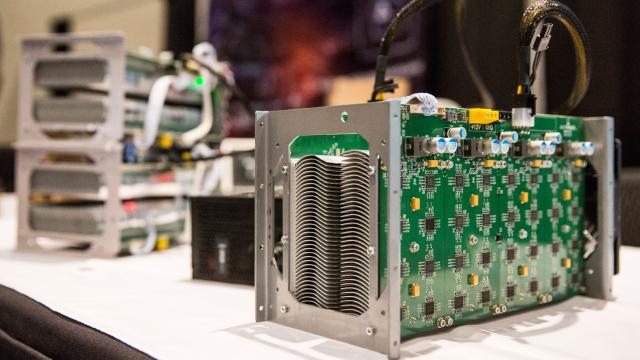With its price fluctuating, sky-high transaction fees, growing traction among competitors and regulatory agencies taking action in several countries, Bitcoin is starved for good news. Today marked another blow against dominant cryptocurrency: China is working to rid itself of bitcoin mining companies.
Image: Getty
Bloomberg reports:
Chinese authorities outlined proposals this week to discourage bitcoin mining — the computing process that makes transactions with the cryptocurrency possible. Officials plan to limit the industry’s power use and have asked local governments to guide miners toward an “orderly” exit from the business, people familiar with the matter said […] Miners have until recently flocked to China because of the country’s inexpensive electricity, local chipmaking factories and cheap labour. They now have little choice but to look elsewhere.
Mining is the process by which sets of bitcoin transactions — called blocks — are verified and added to the blockchain ledger. That verification relies on having powerful computers solve difficult maths problems — with a correctly solved block netting a payout in bitcoin.
Always-on hardware performing intensive computations has steered the trend in mining over Bitcoin’s nine years away from individuals with dedicated laptops and towards syndicates using specialised hardware (called ASICs) in countries with cheap electricity. The confluence of those needs has thus far been met largely in China.
There’s another problem, and it’s one that’s baked into how Bitcoin functions. When it first debuted, the reward for mining a block was 50 BTC. Today it stands at 12.5, having gone down by half in November of 2012 and again in July of 2016. It’s expected to fall to 6.25 BTC in June of 2020.
That’s further complicated by another feature of Bitcoin: the difficulty of those problems thousands of ASICs are humming away to solve increases every 2016 blocks.
Around five years ago, it no longer made financial sense for individual Bitcoin enthusiasts to invest in mining. The probability of successfully solving a block was past parity with the cost of running the firetrap hobbyist equipment required to play.
With China divesting itself of the mining industry, the enormous amount of electricity soaked up by professional hardware and diminishing return on investment suggests the margins these companies operate on will be razor thin — and trending towards nonexistent.
And without miners to validate bitcoin transactions, the “future of money” is dead in the water.
